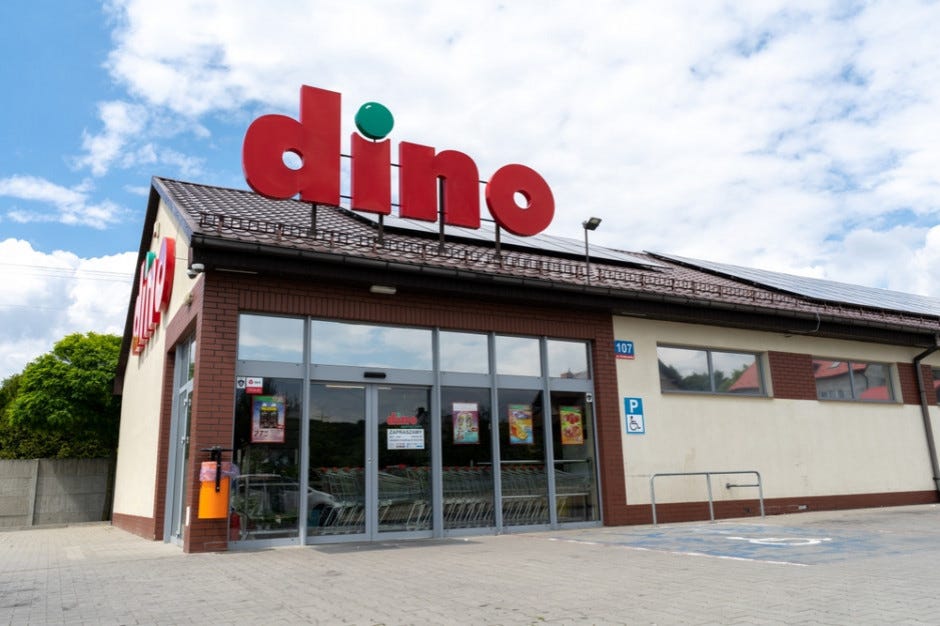Dino Polska: The Fast Growing Polish Powerhouse 💎📈
High insider ownership, High returns on capital, fast growth, decent margins and low debt levels. Dino Polska looks like a great business that I consider a potential multi-bagger.
Hi there investor! 👋🏻
Today we’re breaking down Dino Polska, a fast-growing, quality retailer in Poland.
Poland is the fastest-growing economy in the EU (In GDP terms), making Dino an interesting investment case to consider.
Let’s dive in 👇🏻
The Business
Dino Polska is a Polish retail store chain rapidly expanding in Poland. The retailer was founded in 1999 by Tomasz Biernacki, and the stores were initially located in smaller places outside the cities. What separates Dino Polska from its competitors is that it owns all the premises and land where its stores operate, unlike most competitors, who rent the premises.
Dino Polska's specialty is fresh food, representing ~40% of sales. Every Dino store has a fresh foods section, emphasizing meats like chicken and pork. Dino previously acquired Agro-Rydzyna, a meat manufacturer, which makes it more cost-efficient to offer high-quality products to its customers.
Company History
In 2010 a private equity fund bought 49% of Dino’s shares for ~200 million PLN. In 2010 Dino had 111 stores, by 2017 they had 775 stores across Polen, much thanks to the aggressive expansion strategy of the PE fund. The fund sold its stake in Dino in 2017. At this time Dino was valued at 3.4 billion PLN, about 8.5X more than what they paid for it, 7 years prior. This represents a 35,8% CAGR for the PE fund.
In 2018 Dino Polska was allowed to go into the petrol stations market in Polen under their brand name. Dino has the potential to execute this opportunity as well to further expand their business.
Since 2020, Dino Polska has gone from 1473 stores to 2572 stores in the most recent quarter of 2024 — a rapid expansion.
Dino Polska is a growth story
Dino has rapidly grown their top line while keeping steady EBITDA margins between 8-10%. Dino’s continuous expansion in Poland supports this growth.
Growth 5-year CAGR:
Revenue: 31.61%
Free cash flow per share: 42.01%
EPS: 29.99%
Dino Polska still has plenty of room to grow in Poland. The image below shows the density of stores across the country. Their presence in West Polen is strong, while East and South still have plenty of room to grow.
Healthy balance sheet and debt levels
Dino’s net debt is PLN 568 million. The Net Income in the LTM is PLN 1.429M. The company would have no problem paying down its debt if it needed to or if that was the smartest capital allocation move. Their cash levels are currently PLN 573M.
Profitability
Dino Polska has a gross margin of 23% and an operating margin of ~8%. These margins are better than their competitors — the reason for this is most likely that (1) they own their premises, (2) identical stores reduce complexity and increase operational excellence, and (3) synergy and cost optimization by owning a meat manufacturer.
Competitive advantage
Dino Polska’s business model makes it resilient and not easy to compete with:
Pricing Power - Dino’s LFL sales are consistently above food inflation, this suggests that the company has pricing power in the Polish market. Hopefully, Dino has proven capable of keeping their margins despite inflationary pressures. LFL sales have fallen from their 2022 highs shown below, but it remain above the food inflation levels.
Economics of scale - Dino is able to grow their earnings more rapidly than their variable cost. They pay a cost upfront to acquire the land and premises, but after the fixed costs are paid for they are able to gain operating leverage and increase their margins.
Dino is also able to leverage their size and growth in cooperation with their suppliers to achieve competitive prices while keeping their margins attractive.
Buying the real estate for their stores - One of Dino Polska’s advantages is that they buy the land for their stores. This provides a variable cost advantage to competitors and is similar to what Copart CPRT 0.00%↑ is doing in their market. A few reasons why this is important:
Flexibility: Dino can choose the most attractive sites
Accessibility: Dino can set up stores in smaller villages
Consistency: All Dino stores have the same format/design, which is great for logistics, planning, and efficient distribution.
Cost control: Lower costs in the development and building of the stores, and lower maintenance costs
Real estate appreciation: A bonus of owning real estate is that you also get appreciation if the land increases in value. Their locations are often in popular and growing areas which may give Dino the bonus of increasing value.
Dino Polska seems to have a competitive advantage. Whether this advantage is sustainable is hard to say, but I do think their emphasis on building their stores in an identical manner creates natural advantages in terms of resources used for planning logistics, distribution, building, and maintenance costs.
Additionally, they do not have to pay a lease on the land, they own it. This decreases their variable cost per store, allowing the stores to compete with a cost advantage over competing retailers. Moreover, owning real estate in attractive metropolitan areas in one of the fastest-growing economies can be a lucrative investment. As mentioned this reminds me of how Copart owns the land where they build their scrapyards.
Ownership - High insider ownership
The founder, Tomasz Biernacki, owns 51.07% of the shares in the business. Tomasz is also the chairman of the board.
An involved founder with more than 50% ownership provides a strong incentive for the company to create shareholder value.
The management team
Izabela Biadala - Director of Operations and Administration. Tenure: 22 years
Michal Krauze - Chief Financial Officer. Tenure: 22 years
Piotr Scigala - Director of the Control Department. Tenure: 21 years
The management team has been with the company for more than 20 years and has been an essential part of its growth story.












